
Acta Neophilologica
Scope & Guideline
Advancing linguistic frontiers with open access insights.
Introduction
Aims and Scopes
- Interdisciplinary Literary Analysis:
The journal focuses on literary texts from various genres and periods, employing a range of analytical frameworks, including psychoanalytic, feminist, and postcolonial theories. - Cultural and Ethical Perspectives:
Research often explores the cultural significance of literature and its ethical implications, contributing to discussions on social justice, identity, and representation. - Multilingual and Transnational Studies:
The journal emphasizes the importance of multilingualism and transnational perspectives in literature, highlighting works from diverse linguistic and cultural backgrounds. - Historical Contextualization:
Many articles investigate the historical contexts of literary works, examining how socio-political events influence literary production and reception. - Translation and Adaptation Studies:
A significant focus is placed on translation studies, analyzing how cultural texts are adapted across languages and the implications of these transformations.
Trending and Emerging
- Postcolonial and Decolonial Narratives:
There is an increasing focus on postcolonial and decolonial themes, particularly in relation to identity, representation, and the impacts of colonial histories on contemporary literature. - Gender Studies and Queer Theory:
Research on gender dynamics and queer theory is gaining traction, with articles exploring performativity, feminist perspectives, and the representation of marginalized identities. - Ethical Literary Criticism:
Emerging themes in ethical literary studies are becoming prominent, examining the moral dimensions of literary texts and their societal implications. - Intercultural and Transcultural Dialogue:
The journal is increasingly publishing works that explore intercultural interactions and transcultural narratives, reflecting the complexities of globalized literary landscapes. - Cognitive Literary Studies:
Cognitive approaches to literature are on the rise, with scholars examining how literary texts engage with cognitive processes and ethical considerations in understanding human experiences.
Declining or Waning
- Traditional Canonical Literature:
There appears to be a decline in studies focused solely on traditional canonical literature, with fewer articles dedicated to well-known classics and more emphasis on contemporary and diverse voices. - Regional Literature Studies:
Research centered on specific regional literatures, particularly those that do not engage with broader transnational themes or multilingual contexts, is becoming less common. - Formalist Approaches:
There is a noticeable decrease in strictly formalist literary analyses, as the journal increasingly favors more contextually aware and interdisciplinary methodologies.
Similar Journals

Vestnik Sankt-Peterburgskogo Universiteta-Yazyk i Literatura
Fostering Critical Insights in Linguistics and LiteratureVestnik Sankt-Peterburgskogo Universiteta-Yazyk i Literatura, published by ST PETERSBURG UNIV PRESS, stands as a pivotal academic journal in the fields of linguistics and literature, reflecting a profound commitment to the exploration of language and literary theory. With an ISSN of 2541-9358, this journal has steadily built its reputation since its inception in 2017, achieving impressive rankings in Scopus that place it within the top tiers of its categories—Q2 in Linguistics and Language and Q1 in Literature and Literary Theory as of 2023. The journal serves as an essential platform for researchers, professionals, and students who are keen to delve into the complex interactions between language and literature. Although currently not offering Open Access, its contributions are invaluable to advancing scholarly dialogue and fostering understanding within these vibrant fields. With a converged publication timeline extending through 2024, Vestnik Sankt-Peterburgskogo Universiteta-Yazyk i Literatura exemplifies the ongoing commitment to high-quality research and critical thought, making it an indispensable resource for those dedicated to the study of language and its literary manifestations.

Romanica Olomucensia
Exploring the Depths of Romance StudiesRomanica Olomucensia is a distinguished open-access academic journal published by Palacky University, Department of Romance Philosophical Faculty in the Czech Republic. With its commitment to fostering advanced research in the fields of Literature and Literary Theory as well as Linguistics and Language, this journal aims to provide a platform for scholars, researchers, and students to share their findings and insights. Since its inception, Romanica Olomucensia has consistently been recognized for its quality, securing a position in the Q2 category in the literature domain and achieving a Q3 ranking in linguistics per the 2023 category quartiles. The journal is indexed in Scopus, reflecting its standing in the academic community, with impressive ranks in various arts and humanities disciplines. It has been an open-access journal since 2018, promoting unrestricted access to all its publications, thus enhancing global academic outreach. With a focus on innovation and interdisciplinary studies, Romanica Olomucensia serves as an essential resource for anyone interested in the dynamic interplay of language and literature.

NEOPHILOLOGUS
Transforming Understanding of Linguistic and Literary PhenomenaNEOPHILOLOGUS, published by Springer, stands as a pivotal journal in the fields of Linguistics and Language as well as Literature and Literary Theory. With an illustrious history dating back to 1916 and continuing through various phases until 2024, this journal has entrenched itself as a crucial platform for scholarly discussion and research dissemination. NEOPHILOLOGUS is recognized for its high academic standards, as evidenced by its impressive category quartiles, ranking in the Q2 tier for Linguistics and Language and Q1 for Literature and Literary Theory as of 2023. Notably, it ranks in the 81st percentile for Arts and Humanities in the Scopus database, underscoring its significant contribution to the humanities discourse. While the journal does not currently offer open access options, it remains a valuable resource for researchers, professionals, and students seeking in-depth analyses and insights within its specialized domains. Based in Dordrecht, Netherlands, NEOPHILOLOGUS invites contributions that advance our understanding of linguistic and literary phenomena, ensuring its relevance and impact in these dynamic fields.
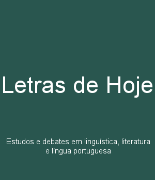
Letras de Hoje-Estudos e Debates em Linguistica Literatura e Lingua Portuguesa
Fostering Innovative Dialogue in Portuguese Language ResearchLetras de Hoje-Estudos e Debates em Linguistica Literatura e Lingua Portuguesa, published by EDITORA UNIV PONTIFICIA UNIV CATOLICA RIO GRANDE SUL-EDIPUCRS, is a leading academic journal in the fields of linguistics, literature, and the Portuguese language. With an esteemed history dating back to 1967, it has proudly maintained an Open Access model, making significant scholarly contributions accessible to researchers, professionals, and students worldwide. The journal serves as a crucial platform for the exchange of innovative ideas, critical discussions, and extensive research findings targeting both theoretical and applied dimensions of language studies. The commitment to fostering community engagement and interdisciplinary dialogue underscores its importance within the academic landscape, encouraging submissions that challenge conventional paradigms and explore the complexities of Portuguese linguistics and literature. For those involved in these dynamic fields, Letras de Hoje remains an essential resource for advancing knowledge and supporting scholarly discourse.
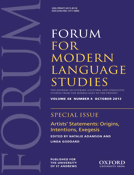
FORUM FOR MODERN LANGUAGE STUDIES
Illuminating the Landscape of Literary TheoryFORUM FOR MODERN LANGUAGE STUDIES is a prestigious academic journal published by Oxford University Press that has been serving the fields of literature and linguistics since its inception in 1965. This journal, with an ISSN of 0015-8518 and an E-ISSN of 1471-6860, plays a crucial role in advancing scholarly discourse on modern language studies, including literature and literary theory. With an impactful presence in both the linguistic and literary domains, it has been recognized in 2023 with a category ranking of Q2 in Literature and Literary Theory and Q3 in Linguistics and Language. It stands out in the competitive landscape, holding a notable position within Scopus rankings, including a 70th percentile ranking in Literature & Literary Theory. While the journal currently does not offer open access options, it remains a vital resource for researchers, educators, and students passionate about the transformative power of language and literature. Its commitment to quality research and robust academic discussion underscores its importance, making it a key platform for those aiming to contribute to modern language scholarship.

Jordan Journal of Modern Languages & Literature
Exploring the Depths of Linguistics and LiteratureJordan Journal of Modern Languages & Literature is a prestigious academic journal published by Yarmouk University, Deanship of Research & Graduate Studies. This journal serves as a vital platform for scholars and researchers in the fields of linguistics and literature, offering a well-rounded examination of modern languages and literary theory. With an impressive Q2 ranking in Linguistics and Language and a Q1 distinction in Literature and Literary Theory as of 2023, it consistently features high-quality research that contributes to the advancement of knowledge in these domains. The Scopus rankings further reflect its academic rigor, placing it in the 79th percentile for Literature and Literary Theory and maintaining significant influence in related fields, making it an essential resource for researchers, professionals, and students alike. Although it does not operate under an open-access model, the journal's commitment to publishing groundbreaking studies can significantly aid in the understanding and progression of modern linguistic and literary practices. The Jordan Journal of Modern Languages & Literature continues to be an influential voice in fostering scholarly dialogue and advancing research in the humanities.
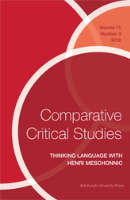
Comparative Critical Studies
Engaging with the Intricacies of Cultural PhenomenaComparative Critical Studies, published by Edinburgh University Press, is a distinguished journal that serves as a vital platform for scholarly discourse in the fields of Cultural Studies and Literature and Literary Theory. Since its inception in 2004, this peer-reviewed journal has garnered significant recognition, achieving a Q2 rating in Cultural Studies and a prestigious Q1 rating in Literature and Literary Theory according to the 2023 Category Quartiles. With its focus on comparative analyses and interdisciplinary approaches, the journal engages a wide range of perspectives from contemporary scholarship, exploring the intricacies of cultural and literary phenomena. Researchers, professionals, and students alike will find value in its rich repository of critical insights, contributing to a deeper understanding of the global literary landscape. Although the journal operates on a traditional subscription model, it remains accessible to a broad audience, creating opportunities for innovative dialogues and collaborations in the evolving fields of literary and cultural studies. Located in the heart of Edinburgh, a city renowned for its rich literary heritage, the journal continues to foster an environment of academic excellence and cultural critique.
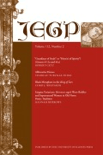
JOURNAL OF ENGLISH AND GERMANIC PHILOLOGY
Bridging Cultures Through Language and LiteratureJournal of English and Germanic Philology, published by University of Illinois Press, stands as a prestigious forum for scholarly discourse in the fields of linguistics and literary studies. With its ISSN 0363-6941 and an impressive impact factor aligning it within the Q1 and Q2 quartiles in key academic categories, this journal delves into nuanced explorations of both the English and Germanic languages, enriching the understanding of language and its literary frameworks. The journal aims to foster interdisciplinary dialogue, offering cutting-edge research that appeals not only to linguists and literary theorists but also to educators and cultural historians alike. Although the journal is not open access, its contributions are essential for anyone keen on enhancing their knowledge of linguistic phenomena and literary narratives from these influential linguistic traditions. With a commitment to publishing innovative and rigorous scholarship, the Journal of English and Germanic Philology is a vital resource for academics seeking to advance their work in language and literature.

Nueva Revista Filologia Hispanica
Pioneering Open Access in Hispanic StudiesNueva Revista Filologia Hispánica, published by COLEGIO MEXICO, A C, DEPT PUBLICACIONES, has been a pivotal resource in the field of Hispanic philology since its establishment in 1966, transitioning to an open-access model that enhances the accessibility of scholarly works in the area. With an ISSN of 0185-0121 and an E-ISSN of 2448-6558, the journal is housed in Mexico City and aims to publish innovative research that contributes to the understanding of the linguistic and cultural dynamics of the Spanish language. It consistently ranks in the Q3 category of Linguistics and Language for 2023, reflecting its commitment to academic excellence as demonstrated by its Scopus ranking in both Arts and Humanities and Social Sciences. With converged years from 2011 to 2024, the journal encourages contributions that inspire further discourse among researchers, professionals, and students, thus solidifying its importance as a scholarly platform in the linguistics landscape.
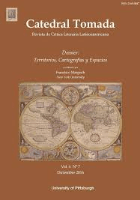
Catedral Tomada-Revista de Critica Literaria Latinoamericana-Journal of Latin American Literary Criticism
Fostering Dialogue in Latin American Literary DiscourseCatedral Tomada - Revista de Crítica Literaria Latinoamericana is a pioneering journal dedicated to the exploration and critique of Latin American literature and its broader cultural implications. Published by the University of Pittsburgh's Library System, this Open Access journal has been instrumental since its launch in 2013 in making scholarly discussions accessible to a wider audience. With an ISSN of 2169-0847, the journal serves as a vital platform for researchers, professionals, and students interested in Literature and Literary Theory, Cultural Studies, and Linguistics and Language. Its esteemed ranking places it in Quartile 1 for Literature and Literary Theory and Quartile 2 for the other categories, underlining its commitment to high-quality academic discourse. Converging insights through a quarterly publication schedule from 2019 to 2024, Catedral Tomada aims to foster a rich dialogue on Latin American literary criticism, encouraging innovative perspectives and diverse voices within the field.